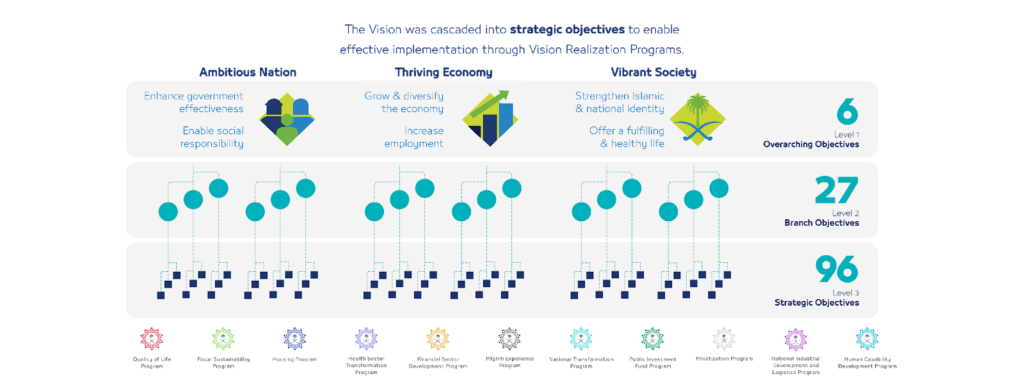Ivalua Named A Leader In The 2025 Gartner Magic Quadrant™ For Source-To-Pay Suites Report
View Report
Ivalua Named A Leader In The 2025 Gartner Magic Quadrant™ For Source-To-Pay Suites Report
View Report
Blog »

by Sara Omer
What is the Saudi Vision 2030 Program?
Launched by the Saudi government in 2016, the Saudi Vision 2030 Program is a sweeping reform initiative with the aim of diversifying the country’s economy and reducing its reliance on oil production.
The vision aims to transform the country into a leading economy, a hub for commercial and cultural activities, and a model for sustainable development. Procurement and supply chain teams will play a crucial role in making this vision a reality. In this blog post, we will explore how sustainable procurement practices can help organizations reduce greenhouse gas emissions and achieve their sustainability goals.
The Procurement function is a vital part of the program and can have a significant impact on its success. It is an important part of the decision-making process and requires careful consideration of a wide range of factors, such as cost, quality, reliability, and delivery times. By ensuring that the right goods and services are purchased at the right price and delivered on time, procurement can help to ensure that a company or organization achieves its goals.
How Procurement contributes to the Saudi Vision 2030 Transformation Projects
Central to the goals of the Saudi Vision program is the pivotal role of procurement. By maximizing resource utilization and implementing careful procurement management, the government can source the best goods and services at the most competitive prices.

Below, we outline the 3 essential goals and initiatives of the program and how procurement plays a vital role in its execution and success!
Key 3 Objectives and the Role of Procurement
1. Bolstering the Local Economy
The Saudi Vision Program aims to support nearby businesses, create jobs, and stimulate the local economy by procuring goods and services locally. When you work with local experts and access nearby resources, you can ensure top-quality products. However, implementing category strategies for successful sourcing and supplier management can be challenging without the right tools. Analyzing spend and executing these processes across all spend is crucial to navigating these complexities. The Saudi 2030 Vision invests in the community to drive local business growth!
When businesses start sourcing local goods and services, they are presented with new opportunities to network and form strong bonds with local business owners. By doing this, these businesses can tap into unique business insights that are specific to the region. Having access to this knowledge and expertise can greatly improve the quality of products and services that a business offers.
Sourcing locally is not just beneficial for individual businesses but the entire local economy. When businesses start working with local suppliers, they become part of a growing cycle of economic development. Working together to build a stronger and more resilient economy provides opportunities for all companies in the area. When businesses start sourcing goods and services locally, they create employment opportunities within the local community. This improves living standards, reduces poverty levels, and can provide stable economic growth to the surrounding community. With a strong local economy and stable employment opportunities, businesses can further propel their growth and development. With more resources at their disposal, local talents can create innovative solutions that can further transform the regional economy.
Developing and executing category strategies is critical to effective strategic sourcing. However, many organizations are not equipped with the automation, standardization, and analytical tools to successfully carry out these complex processes. That’s why it’s important to analyze spend and successfully define/execute sourcing and supplier management strategies across all spend.
2. Deploying Digitization
Revolutionizing procurement with digital technology is crucial for advancing the Saudi digital economy. It empowers organizations to simplify the procurement process, enhance productivity, and reduce expenses.
With streamlined processes, purchasing products and services becomes faster, cheaper, and more efficient. The smartest organizations are making the switch from manual methods to digital ones to minimize mistakes and maximize results at every stage of the procurement journey – from initial order to final shipment.
Unlocking the benefits of procurement digitization requires the right tools and strategy. Unlike other operations, procurement heavily relies on transactions and processes, making it the perfect candidate for digital transformation. By prioritizing digital tools, it’s possible to cut back on time spent on repetitive tasks and increase worker productivity. Let’s explore how digitization can help streamline procurement operations and revolutionize your approach.
3. Carbon Reduction
Procurement and Supply Chain teams are essential players in the race to reduce Greenhouse Gas (GHG) Emissions–specifically Scope 3 carbon emissions. With over 75% of total emissions being from an organization’s value chain, businesses must look to suppliers to build a more sustainable supply chain.
By carefully considering the environmental impact of purchasing decisions, companies can reduce the amount of pollution generated by their activities. Sustainable procurement requires companies to look beyond traditional purchasing criteria, such as price, and consider the environmental impact of their purchases.
For example, a company may choose to purchase green energy from renewable sources, such as wind and solar, instead of relying on electricity generated from burning fossil fuels. This reduces the amount of greenhouse gasses released into the atmosphere, helping to reduce global warming. Similarly, companies can also choose to purchase products and materials that are manufactured in an environmentally responsible manner, such as products made from recycled materials or certified organic ingredients.
Conclusion
By prioritizing cost efficiency and sustainability, effective procurement strategies can cut costs and boost profitability for the Saudi transformation projects. Furthermore, maximizing the impact of strategic decisions is key in transforming Saudi Arabia and achieving the Vision 2030 goals.
If you’d like to learn more on how Ivalua’s solutions can contribute to the Saudi Vision 2030 transformation projects and how Ivalua can transform it into reality, this webinar is a great place to start!
More Resources: Strategic Sourcing, eProcurement, Environmental Impact Center

Sara Omer is a Senior Procurement Change Champion with an outstanding record of delivering complex eProcurement solutions for public and private sector clients, and in financial services, education and property development throughout the Middle East and North Africa. Sara currently leads the Ivalua eProcurement business in the Middle East region, and is a current Alumni of the Masters of Law in Public Procurement and Policy Program in Nottingham University.
She has been, and continues to be, leading in the role of consulting for regional public sector organizations in all matters related to Digital Procurement Transformation and Governance. Sara is the first African / Arab female member in the Board of Trustees of the Chartered Institute of Procurement and Supply (CIPS), and the first female Fellow of the institute among Arab women in the MENA region, with 20+ years of full-time experience in Procurement, SRM, Procurement Technology, procurement consulting and new technology markets’ expansion.